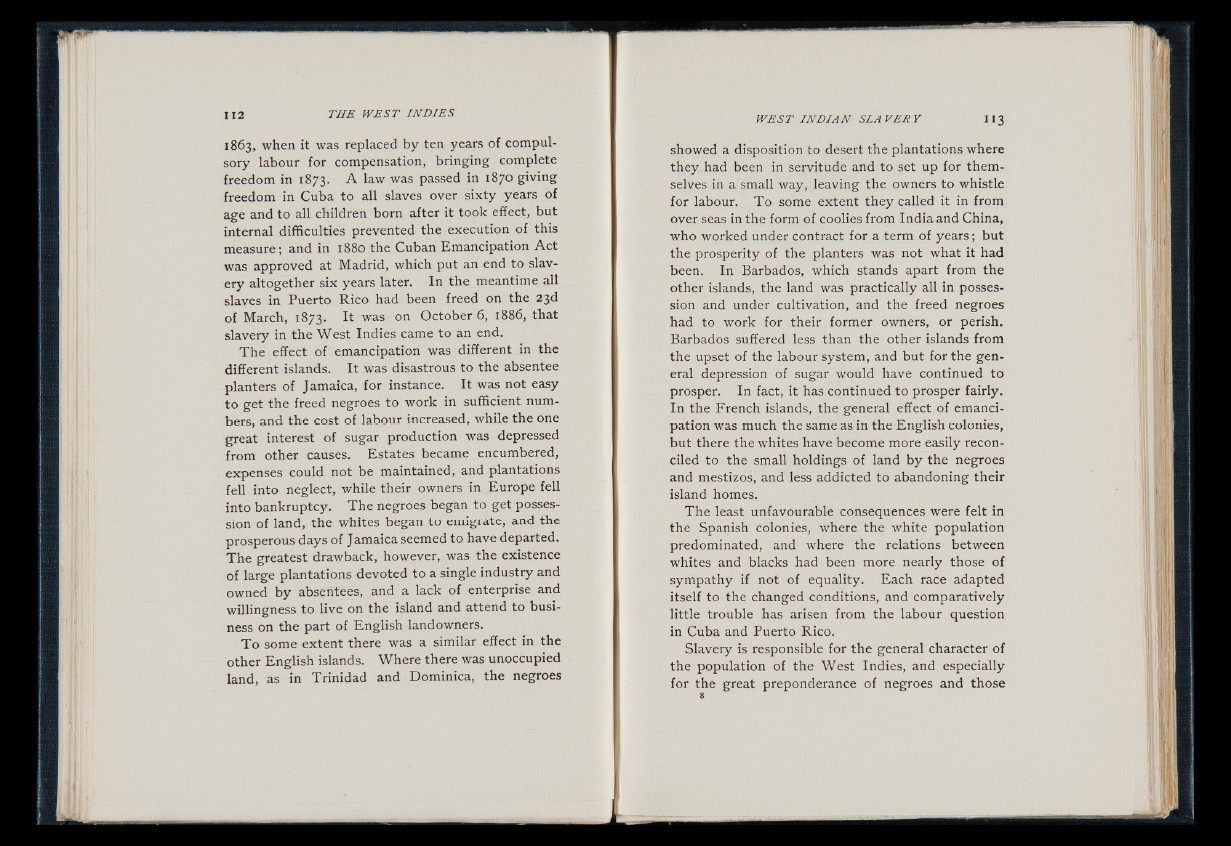
1863, when it was replaced by ten years of compulsory
labour for compensation, bringing complete
freedom in 1873. A law was passed in 1870 giving
freedom in Cuba to all slaves over s ix ty years of
age and to all children born after it took effect, but
internal difficulties prevented the execution of this
measure; and in 1880 the Cuban Emancipation A c t
was approved at Madrid, which put an end to slavery
altogether six years later. In the meantime all
slaves in Puerto Rico had been freed on the 23d
of March, 1873. I t was on October 6, 1886, that
slavery in the W e s t Indies came to an end.
T h e effect of emancipation was different in the
different islands. It was disastrous to the absentee
planters of Jamaica, for instance. It was not easy
to get the freed negroes to work in sufficient numbers,
and the cost of labour increased, while the one
great interest of sugar production was depressed
from other causes. Estates became encumbered,
expenses could not be maintained, and plantations
fell into neglect, while their owners in Europe fell
into bankruptcy. T h e negroes began to get possession
of land, the whites began to emigrate, and the
prosperous days of Jamaica seemed to have departed.
T he greatest drawback, however, was the existence
of large plantations devoted to a single industry and
owned by absentees, and a lack of enterprise and
willingness to live on the island and attend to business
on the part of English landowners.
T o some extent there was a similar effect in the
other English islands. Where there was unoccupied
land, as in Trinidad and Dominica, the negroes
showed a disposition to desert the plantations where
they had been in servitude and to set up for themselves
in a small way, leaving the owners to whistle
for labour. To some extent they called it in from
over seas in the form of coolies from India and China,
who worked under contract for a term of years; but
the prosperity of the planters was not what it had
been. In Barbados, which stands apart from the
other islands, the land was practically all in possession
and under cultivation, and the freed negroes
had to work for their former owners, or perish.
Barbados suffered less than the other islands from
the upset of the labour system, and but for the general
depression of sugar would have continued to
prosper. In fact, it has continued to prosper fairly.
In the French islands, the general effect of emancipation
was much the same as in the English colonies,
but there the whites have become more easily reconciled
to the small holdings of land by the negroes
and mestizos, and less addicted to abandoning their
island homes.
T h e least unfavourable consequences were felt in
the Spanish colonies, where the white population
predominated, and where the relations between
whites and blacks had been more nearly those of
sympathy if not of equality. Each race adapted
itself to the changed conditions, and comparatively
little trouble has arisen from the labour question
in Cuba and Puerto Rico.
Slavery is responsible for the general character of
the population of the West Indies, and especially
for the great preponderance of negroes and those